
The Iceland Example
- Reject the fraudulent idea that debts perpetrated by capitalist leaders should be borne by "the people"
- Arrest and convict capitalist leaders who commit political and economic crimes
Whatever fate befalls Iceland in the future, its people have provided an example for citizens the world over to follow. This is a way forward for the American political and economic system. As we'll see in the section of this essay on Iceland's history, Iceland has been controlled and criminally manipulated by a capitalist junta similar to the American cabal, and is still somewhat under the thumb of this junta to this day. Despite, the depredations of the Icelandic junta, however, Icelandic citizens have been able to elect a number of more progressive leaders and reject responsibility for Icelandic capitalist debts. 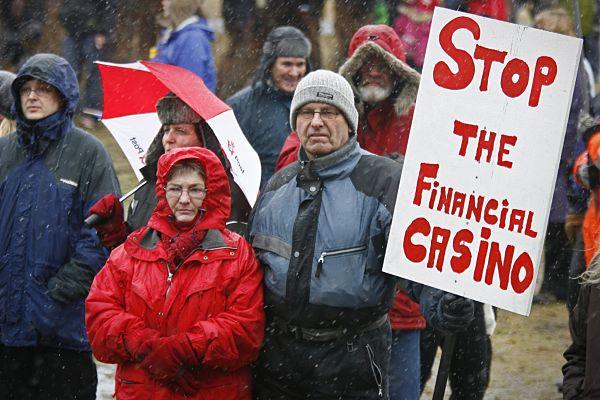 The people of Iceland twice voted not to repay international debts incurred by banksters, rejecting the idea that "the people" are responsible for bankster debts. Icelandic citizens held a first referendum in the spring of 2009 to decide whether the people should pay for the criminally incurred debts of the banksters and whether their government could impose these debts on the people without their consent. Ninety-three percent voted no! In April of 2011 the Icelandic citizens held a second referendum to decide whether to accept or reject a government-concocted agreement negotiated between Iceland, the Netherlands and the UK to pay back the British and Dutch governments for the money they spent to recompense savers with the failed Icesave bank. Covering the debt would have cost Iceland's 317,000 citizens around $17,000 each. Again, they voted to reject the capitalist "agreement;" this time by close to sixty percent (58.9%).
The people of Iceland twice voted not to repay international debts incurred by banksters, rejecting the idea that "the people" are responsible for bankster debts. Icelandic citizens held a first referendum in the spring of 2009 to decide whether the people should pay for the criminally incurred debts of the banksters and whether their government could impose these debts on the people without their consent. Ninety-three percent voted no! In April of 2011 the Icelandic citizens held a second referendum to decide whether to accept or reject a government-concocted agreement negotiated between Iceland, the Netherlands and the UK to pay back the British and Dutch governments for the money they spent to recompense savers with the failed Icesave bank. Covering the debt would have cost Iceland's 317,000 citizens around $17,000 each. Again, they voted to reject the capitalist "agreement;" this time by close to sixty percent (58.9%).
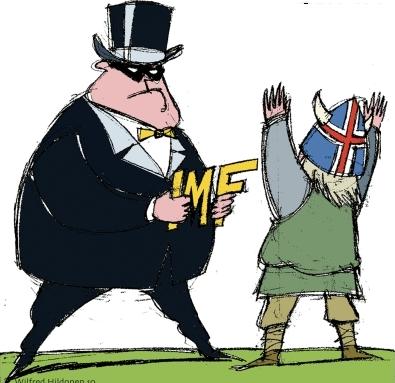 This rejection of the bankster "agreement" was highly significant since current European governments, pressured by speculators such as Goldman Sachs, JPMorganChase, the IMF, and the European Commission were calling for the imposition of austerity measures on Icelandic citizens, for which they had not voted. After the second Icelandic referendum, even the pro-capitalist Financial Times on 4/13/2011 had to acknowledge that Icelandic citizens had voted to "put citizens before banks."
This rejection of the bankster "agreement" was highly significant since current European governments, pressured by speculators such as Goldman Sachs, JPMorganChase, the IMF, and the European Commission were calling for the imposition of austerity measures on Icelandic citizens, for which they had not voted. After the second Icelandic referendum, even the pro-capitalist Financial Times on 4/13/2011 had to acknowledge that Icelandic citizens had voted to "put citizens before banks."
To see how and why all this transpired in Iceland, we need to review what capitalist atrocities they had experienced. The economic terrorism visited upon Icelandic citizens is essentially the same as that suffered by American and other citizens throughout the world.
"After more than 600 years of foreign rule, Iceland's social structure was the most feudal of all Nordic countries at the beginning of the 20th century. Fishing dominated the economy, generating most of the foreign-currency earnings and allowing the development of an import-based commercial sector. This created urban economic activities: construction, services, light industry. After the second world war the economy grew strongly, because of Marshall Plan aid (there was a large US-Nato military base); an abundant export commodity, cold-water fish, unusually blessed with high income elasticity of demand; and a small, literate population with a strong sense of national identity.
"As Iceland became more prosperous it established a welfare state, in line with the tax-financed Scandinavian model, and by the 1980s had attained a level and a distribution of disposable income equal to the Nordic average. Yet it remained both more regulated and more patron-client-dominated than its European neighbours; a local oligopoly restricted the political and economic landscape.
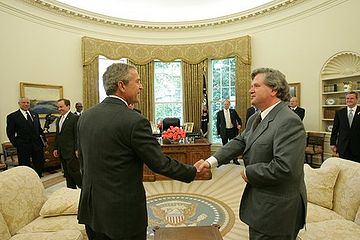 "There is a direct line of descent from the quasi-feudal power structures of the 19th century to the modernised Icelandic capitalism of the later 20th century, when a bloc of 14 families, popularly known as The Octopus, were the economic and political ruling elite. The Octopus controlled imports, transport, banking, insurance, fishing and supplies to the Nato base and provided most top politicians. The families lived like chieftains.
"There is a direct line of descent from the quasi-feudal power structures of the 19th century to the modernised Icelandic capitalism of the later 20th century, when a bloc of 14 families, popularly known as The Octopus, were the economic and political ruling elite. The Octopus controlled imports, transport, banking, insurance, fishing and supplies to the Nato base and provided most top politicians. The families lived like chieftains.
"The Octopus controlled the rightwing Independence Party (IP) which dominated the media and decided on senior appointments in the civil service, police and judiciary. The local, state-owned banks were effectively run by the dominant parties, the IP and the Centre Party or CP. Ordinary people had to go through party functionaries to get loans to buy a car, or for foreign exchange for travel abroad. Power networks operated as webs of bullying, sycophancy and distrust, permeated with a macho culture, something like the former Soviet Union.
"This traditional order was challenged from within by a neoliberal faction, the Locomotive group, which had coalesced in the early 1970s after law and business administration students at the University of Iceland took over a journal, The Locomotive, and promoted free-market ideas. Their aim was not just to transform the society but also to open career opportunities for themselves, rather than wait for Octopus patronage. At the end of the cold war their position strengthened materially and ideologically, as the communists and social democrats lost public support. The future IP prime minister, David Oddsson, was a prominent member.
"Oddsson, born in 1948 with a middle-class background, was elected as an IP councillor to the Reykjavik municipal council in 1974; by 1982 he was mayor of Reykjavik, leading privatisation campaigns, including selling off the municipality's fishing industry, to the benefit of members of the Locomotive group. In 1991 he led the IP to victory in the general election, and reigned (not too strong a word) as prime minister for 14 years, overseeing the growth of the financial sector, before installing himself as governor of the Central Bank in 2004. He had little experience or interest in the world beyond Iceland. His Locomotive group protégé Geir Haarde, finance minister from 1998 to 2005, took over as prime minister shortly after. These two men most directly steered Iceland's great experiment to create an international financial centre in the North Atlantic, midway between Europe and America.
"The liberalisation of the economy began in 1994, when accession to the European Economic Area, the free-trade bloc of EU countries, plus Iceland, Lichtenstein and Norway, lifted restrictions on cross-border flows of capital, goods, services and people. The Oddsson government then sold off state-owned assets and deregulated labour. Privatisation began in 1998, implemented by Oddsson and Halldor Asgrimsson, the leader of the CP. Of the banks, Landsbanki was allocated to IP grandees, Kaupthing to their counterparts in the CP, its coalition partner; foreign bidders were excluded. Later, Glitnir, a private bank formed from the merger of several smaller ones, joined the league.
"So Iceland roared into international finance aided globally by abundant cheap credit and free capital mobility, and domestically by strong political backing for the banks. The new banks merged investment banking with commercial banking, so that both shared government guarantees. And the country had low sovereign debt, which gave the banks high marks from the international credit-rating agencies. The major shareholders of Landsbanki, Kaupthing, Glitnir and their spin-offs reversed the earlier political dominance of finance: government policy was now subordinated to the ends of finance.
"Oddsson and friends relaxed the state-provided mortgage rules, allowing 90% loans. The newly privatised banks rushed to offer even more generous terms. Income tax and VAT rates were lowered to turn Iceland into a low-tax international financial centre. Bubble dynamics took hold. City planners aimed to move Reykjavik from the trajectory of an ordinary city to that of a world city (despite its small population of 110,000) and approved several grandiose new public and private buildings, saying "If Dubai, why not Reykjavik?"
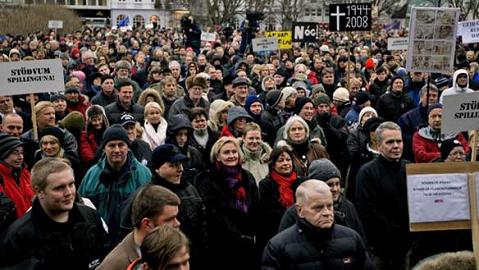 "Iceland's new banking elite were intent on expanding their ownership of the economy, competing and cooperating with each other. Using their shares as collateral, some took out large loans from their own banks, and bought more shares in the same banks, inflating share prices. It worked like this: Bank A lent to shareholders in Bank B, who bought more shares in B using shares as collateral, raising B's share price. Bank B returned the favour. The share prices of both banks rose, without new money coming in. The banks not only grew bigger, they grew more and more interconnected. Several dealings of this kind are now under criminal investigation by the special prosecutor, as cases of market manipulation.
"Iceland's new banking elite were intent on expanding their ownership of the economy, competing and cooperating with each other. Using their shares as collateral, some took out large loans from their own banks, and bought more shares in the same banks, inflating share prices. It worked like this: Bank A lent to shareholders in Bank B, who bought more shares in B using shares as collateral, raising B's share price. Bank B returned the favour. The share prices of both banks rose, without new money coming in. The banks not only grew bigger, they grew more and more interconnected. Several dealings of this kind are now under criminal investigation by the special prosecutor, as cases of market manipulation.
"Tiny Iceland soon managed to enter the big-bank league, with three banks in the world's biggest 300 by 2006. The super-abundance of credit allowed people to consume in extravagant celebration of their escape from the earlier decades of credit rationing (on top of the earlier escape from foreign rule as recently as 1944). They saw themselves as fully independent at last, which may explain their happiness ranking. The owners and managers remunerated themselves on an ever-larger scale. The richer they were, the more they attracted political support. Their private jets, roaring in and out of Reykjavik's airport, seemed to be visual and auditory proof to the part-admiring, part-envious population below. Income and wealth inequality surged, helped by government policies that shifted the tax burden to the poorer population. The bankers made large financial contributions to the governing parties and giant loans to key politicians. The leading Icelandic champion of free-market economics declared in The Wall Street Journal: "Oddsson's experiment with liberal policies is the greatest success story in the world."
"In the euphoria, the dangers of a strategy of "economic growth based on vast foreign borrowing" were overlooked. Icelanders lived out the dictum of Plautus, the third century BC Roman playwright, who had one of his characters declare: 'I am a rich man, as long as I do not repay my creditors.'
"In 2006 there were worries in the financial press about the stability of the big banks, which were beginning to have problems raising funds in the money markets (on which their business model depended). Iceland's current account deficit had soared from 5% of GDP in 2003 to 20% in 2006, one of the highest in the world. The stock market multiplied itself nine times over between 2001 and 2007.
"Landsbanki, Kaupthing and Glitnir were operating far beyond the capacity of Iceland's Central Bank to support them as lender of last resort; their liabilities were real, but many of their assets were dubious. In February 2006 Fitch downgraded Iceland's outlook from stable to negative and triggered the 2006 'mini-crisis': the krona fell sharply, the value of banks' liabilities in foreign currencies rose, the stock market fell and business defaults rose, and the sustainability of foreign-currency debts became a public problem, The Danske Bank of Copenhagen described Iceland as a "geyser economy" on the point of exploding.
|
"The lesson here is instructive across the pond, but it is a chilling one. If the U.S.--or any sovereign for that matter--attempts to restructure their debts, or to force private investors to take a haircut on their own foolish gambles, these international institutions have promised the equivalent of economic war in response. However, the alternative is for representative governments to sacrifice their independence to a cadre of faceless bankers who share no allegiance to any nation. "It is the conflict that has already defined the beginning of the 21st Century. The question is whether free peoples will choose to remain free, as Iceland has, or to submit."
|
"Icelandic bankers and politicians brushed aside the crisis. Iceland's Central Bank took out a loan to double the foreign-exchange reserves, while the Chamber of Commerce, run by representatives of Landsbanki, Kaupthing, Glitnir and their spin-offs, responded with a PR campaign. It paid the American monetary economist Frederic Mishkin $135,000 to lend his name to a report attesting to the stability of Iceland's banks. It allegedly paid the London Business School economist Richard Portes £58,000 ($95,000) to do the same for a later report. The supply-side economist Arthur Laffer assured the Icelandic business community in 2007 that fast economic growth with a large trade deficit and ballooning foreign debt were signs of success: 'Iceland should be a model to the world.' The value of the banks' 'assets' was then around eight times greater than Iceland's GDP.
"In the elections of May 2007, the Social Democratic Alliance (SDA) entered a coalition government with the still-dominant IP. To the consternation of many supporters, SDA leaders ditched their pre-election pledges and endorsed the continued expansion of the financial sector.
"Though they had survived 2006, Landsbanki, Kaupthing and Glitnir had trouble raising money to fund their asset purchases and repay existing debts, largely denominated in foreign currencies. So Landsbanki pioneered Icesave, an internet-based service that aimed to win retail savings deposits by offering more attractive interest rates than high-street banks. Established in Britain in October 2006, and in the Netherlands 18 months later, Icesave caught the attention of best buy internet finance sites and was soon flooded with deposits. Millions of pounds arrived from Cambridge University, the London Metropolitan Police Authority, even the UK Audit Commission, responsible for overseeing local government funds, as well as 300,000 Icesave depositors in the UK alone.
"Icesave entities were legally established as branches, rather than subsidiaries, so they were under the supervision of the Icelandic authorities, rather than their hosts. No one noticed that the Icelandic regulatory agency had a total staff, including receptionist, of only 45 and suffered high turnover as many went on to join the banks, which offered better pay. No one worried much that, because of Iceland's obligations as a member of the EEA deposit insurance scheme, its population of 320,000 would be responsible for compensating the depositors abroad in the event of failure. Landsbanki's shareholders reaped the short-term profits while most Icelanders didn't know anything about Icesave at all.
"The second 'solution' to difficulties in raising new funds was a way to get more access to liquidity without pledging real assets as collateral. The Big Three sold debt securities to a smaller regional bank, which took these bonds to the Central Bank and borrowed against them, without having to supply further collateral; they then lent back to the initiating big bank. The bonds were called 'love letters' -- mere promises. By participating in this game and accepting as collateral claims on other Icelandic banks the central bank was conniving in the banks' strategy of gambling for resurrection.
"Then the banks internationalised the process: the Big Three established subsidiaries in Luxembourg and sold love letters to them. The subsidiaries sold them on to the Central Bank of Luxembourg or the European Central Bank and received cash in return, which they could pass back to the parent bank in Iceland or use themselves. The OECD calculates that just the domestic love letters, between the CBI and the Icelandic banks, incurred losses to the CBI and the Treasury of 13% of GDP (OECD Economic Surveys: Iceland, June 2011).
"The Icelandic banks fell two weeks after Lehman Brothers. On 29 September 2008, Glitnir approached Oddsson at the Central Bank for help with its looming liquidity problem. To restore confidence, Oddsson instructed the Central Bank to buy 75% of Glitnir's shares. The effect was not to boost Glitnir but to undermine confidence in Iceland. The country's rating plunged, and credit lines were withdrawn from Landsbanki and Kaupthing. A run on Icesave's overseas branches began. Oddsson moved on 7 October 2008 to peg the krona to a basket of currencies at close to the pre-crisis value. With the currency tumbling and in the absence of capital controls, the foreign-exchange reserves were exhausted: the peg lasted for only a few hours, just long enough for those in the know to change their money out of the krona at a much more favourable rate. Inside sources indicate that billions left the currency in these hours. Then the krona was floated, and sank. On 8 October the then UK prime minister, Gordon Brown, froze Landsbanki's UK assets under the anti-terrorism laws. The stock market, bank bonds, house prices and average income went into free-fall.
"The IMF arrived in Reykjavik in October 2008 to prepare a crisis-management programme, the first time the Fund had been called in to rescue a developed economy since Britain in 1976. It offered a conditional loan of $2.1bn to stabilise the krona and backed the British and Dutch governments' demands that Iceland should honour the obligations of the European deposit-guarantee scheme and recompense them for their bailouts of Icesave depositors.
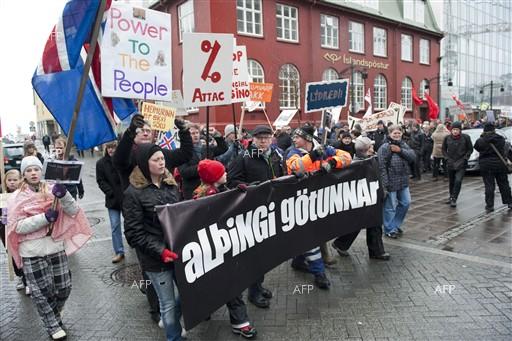
"Iceland's normally placid population erupted in an angry protest movement, principally targeted at Haarde, Oddsson and the IP, although the SDA's foreign minister Ingibjorg Gisladottir was considered tarnished too. Thousands of people assembled in Reykjavik's main square on freezing Saturday afternoons between October 2008 and January 2009, banged saucepans, linked arms in a circle around the parliament building to demand the government's resignation, and pelted the building with food.
"In January 2009, the IP-SDA coalition broke. To date, Iceland is the only country to have shifted distinctly to the left after the financial crisis. An interim SDA-LGM (Social Democrats-Left Green Movement) government was formed in January 2009 to lead until April's election. In the election the IP was reduced to 16 seats, despite the overwhelming bias of the electoral system in its favour, its worst result since its formation in 1929.
"The SDA-LGM government came under immediate pressure to repay the Icesave debt; much of the IMF loan was withheld until Reykjavik agreed. The new government was also divided on whether to apply for full membership of the EU and Eurozone, with most of the SDA strongly in favour. After long negotiations, the government presented the terms they had agreed on the Icesave debt to the parliament in October 2009: £5.5bn ($7.8bn), or 50% of Iceland's GDP, was to be paid to the British and Dutch treasuries between 2016 and 2023.
.jpg)
"The party's health minister resigned in protest, five dissidents refused to vote with the government. The bill was forced through on 30 December 2009, against high feelings in the country. On 5 January 2010 President Grimsson announced that he would not sign it into law, out of respect for the national sentiment. In the ensuing referendum the bill was decisively rejected. In the May 2010 Reykjavik municipal elections, the SDA slumped to 19% and a comedian was elected as the city's mayor. In October protests resumed, and the coalition conceded the election of a constitutional assembly to draw up a new constitution (the existing one having been inherited from Denmark on independence in 1944). When the election was invalidated by the Supreme Court, the assembly was reconvened as a constitutional council appointed by parliament.
"The deal on the table in this April's second Icesave referendum involved substantial concessions on the part of the British and Dutch governments. After the no vote, the disagreement may have to go to international courts.
"The cost of losses on loans and guarantees, added to the cost of restructuring financial organisations, brings the total direct fiscal costs of the crisis to about 20% of GDP, higher than in any other country except Ireland (OECD Economic Surveys, Iceland, June 2011). But the postponement of major public spending cuts until this year [2011] has given the economy breathing space; and the sharp devaluation has helped to generate a trade surplus for the first time in many years. So far, Iceland has experienced smaller falls in GDP and employment than big public-spending slashers like Ireland, Estonia and Lithuania. The unemployment rate, only 2% in 2006, has been between 7% and 9% since 2009; but the rate of outmigration, of Icelanders and other European workers (predominantly Polish), has been the highest since 1889. However, the SDA-LGM government has announced drastic cuts in public spending for 2011 and beyond. Local governments have no budget for fresh projects. Hospitals and schools are cutting salaries and sacking employees. The freeze on house repossessions expired in 2010.
"The IP-SDA government's decision to provide unlimited bank deposit guarantees illustrates its debt to the financial elite. Had it limited the guarantee to 5m krona ($70,000), it would have protected the entire deposits of 95% of depositors; only the wealthiest 5%, including many politicians, benefited from the unlimited guarantee, which now means further constraints on public spending.
"Iceland's tiny scale seemed to make it easier to challenge the government's denial of the impending crisis, but the opposite was true. The Oddsson government undertook an extreme privatisation of information. Iceland's National Economic Institute had a reputation for independent thinking, and Oddsson abolished it in 2002. From then on the banks, international rating companies and the Chamber of Commerce provided almost the only information and running commentary on the state of the economy, present and future.
"Paradoxically, a number of critical reports were published when the bubble was in the early stages, including one by the CBI. But by 2007-08, when the dangers were acute, reports, including those by the IMF, became noticeably softer in tone. It seems that the official financial institutions, as well as bankers and politicians, understood that the situation was so fragile that just to speak of it might trigger a run on the banks.
"In October 2010 the parliament decided to charge Prime Minister Haarde for breach of ministerial responsibility. The permanent finance secretary Baldur Gudlaugsson (former member of the Locomotive group) has been given two years in prison for using inside information for his personal advantage while selling his shares in Landsbanki in September 2008. But the special prosecutor in charge of the investigation of the banks has been working with a team of 60 lawyers and others for the past two years and has so far brought no charges. Meanwhile Oddsson was appointed in September 2009 as editor-in-chief at Morgunbladid, the leading Iceland daily, and orchestrated coverage of the crisis. A commentator said that was like appointing Nixon editor of The Washington Post after Watergate. Iceland's elite looks after its own." 1
When a nation such as Iceland goes up against the global capitalist cabal, we can expect it to retaliate in any way possible. As of September, 2011, two cabal retaliatory operations have been launched against Iceland:
-
Israeli Zionists falsely accuse Icelanders of racism
- The current cabal U.S. puppet regime is planning economic sanctions against Iceland, using the excuse of whaling irregularities
The Icelandic example is one of genuine significance: citizens in all countries besieged by international capitalist vultures should refuse to bail them out when their criminal operations threaten the entire economy. But Iceland's example is also one of only partial success: 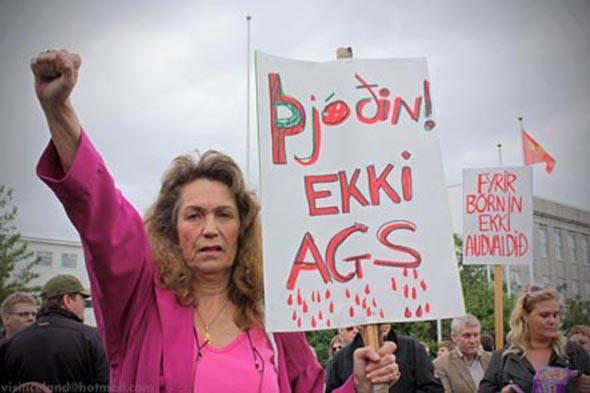
-
The Icelandic people failed to extricate themselves from their capitalistic economy
-
They failed to eradicate their capitalist ruling junta
- They failed to institute a cooperative commonwealth economy for the benefit of all citizens--even though their writing a new constitution gave them the perfect opportunity to do so
We can certainly take an important lesson from what Icelandic citizens have been able to do. But, in echoes of Lincoln's great address, it is for us to be dedicated to the unfinished work which the Icelandic people so nobly advanced. It is rather for us to be here dedicated to the great task remaining before us--the replacement of fascism and predatory capitalism with a cooperative commonwealth polity that shall initiate a new birth of freedom through a government of the people, by the people, for the people.

Notes:
Reference and Updates:
-
What The World Can Learn From Iceland's Default Model (with some capitalist quibbles)
Shadow Elite: The "Inside Job" That Toppled Iceland's Economy
-
Lessons From Iceland [longer version of the preceding article]
-
Saving Iceland Website
-
Iceland's economy has 'turned corner' says minister
Sept. 27, 2011
VIEW ALL VIDEOS
http://www.hermes-press.com/iceland_index.htm
